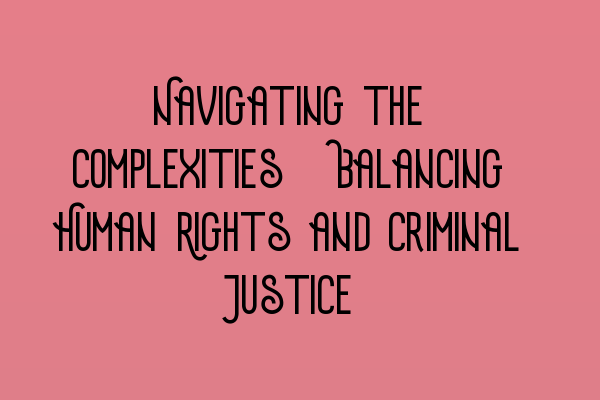Navigating the Complexities: Balancing Human Rights and Criminal Justice
Welcome to the SQE Criminal Law & Practice Law UK blog, where we explore the intricate world of criminal justice and its intersection with human rights. In today’s post, we delve into the complexities of striking a balance between safeguarding human rights and upholding the principles of criminal justice. This delicate equilibrium is essential for a fair and just legal system.
The Importance of Human Rights in Criminal Justice
Human rights are fundamental principles that aim to protect individuals and ensure their dignity, freedom, and equality. The incorporation of human rights into criminal justice systems is crucial to prevent abuse of power, ensure fair trials, and protect the rights of the accused.
When it comes to criminal justice, human rights play a pivotal role in guaranteeing access to justice, presumption of innocence, a fair trial, and protection from torture and inhumane treatment. These principles serve as the foundation for a just legal system that respects the rights of both victims and defendants.
Understanding the Challenges
However, balancing human rights with the goals of criminal justice can be challenging. Law enforcement agencies must ensure public safety and protect society from potential harm, often leading to tough decisions that may put human rights at stake. This delicate balance requires careful thought, consideration, and expertise to prevent any potential infringement of human rights.
For criminal justice professionals, navigating these complexities is a constant challenge. It requires not only a comprehensive understanding of the law but also a deep awareness of human rights principles and their implications in criminal cases.
Strategies to Achieve a Proper Balance
While it may seem daunting, achieving a balance between human rights and criminal justice is possible. Here are some strategies to help navigate this intricate terrain:
- Educate and Train: Continuous education and training of legal professionals on human rights principles and their practical implementation in criminal justice are essential. Enroll in SQE 1 Preparation Courses to enhance your knowledge.
- Promote Dialogue: Dialogue between criminal justice professionals, human rights advocates, and relevant stakeholders can foster a better understanding and collaboration in addressing potential conflicts.
- Adhere to International Standards: Compliance with international human rights standards, such as the European Convention on Human Rights, establishes a framework for consistent and fair application of the law.
- Use Technology Responsibly: Embrace technological advancements to enhance efficiency and accuracy but ensure responsible use to safeguard human rights.
- Regularly Review and Reflect: Honest assessments and evaluations of current practices and policies are crucial to adapt to evolving legal landscapes and maintain the delicate balance between human rights and criminal justice.
By incorporating these strategies into daily practice, criminal justice professionals can work towards a system that upholds human rights while effectively administering justice.
Conclusion
Striking a balance between human rights and criminal justice is a complex endeavor that requires a multidisciplinary and comprehensive approach. Criminal justice professionals must constantly navigate this intricate terrain to ensure the protection of human rights while upholding the principles of justice. By educating ourselves, promoting dialogue, adhering to international standards, responsibly using technology, and regularly reviewing and reflecting on our practices, we can achieve this delicate equilibrium.
For more information on other legal topics, check out our related articles:
- SQE 1 Practice Exam Questions
- SQE 1 Practice Mocks FLK1 FLK2
- SQE 2 Preparation Courses
- SQE 1 Preparation Courses
- SRA SQE Exam Dates
